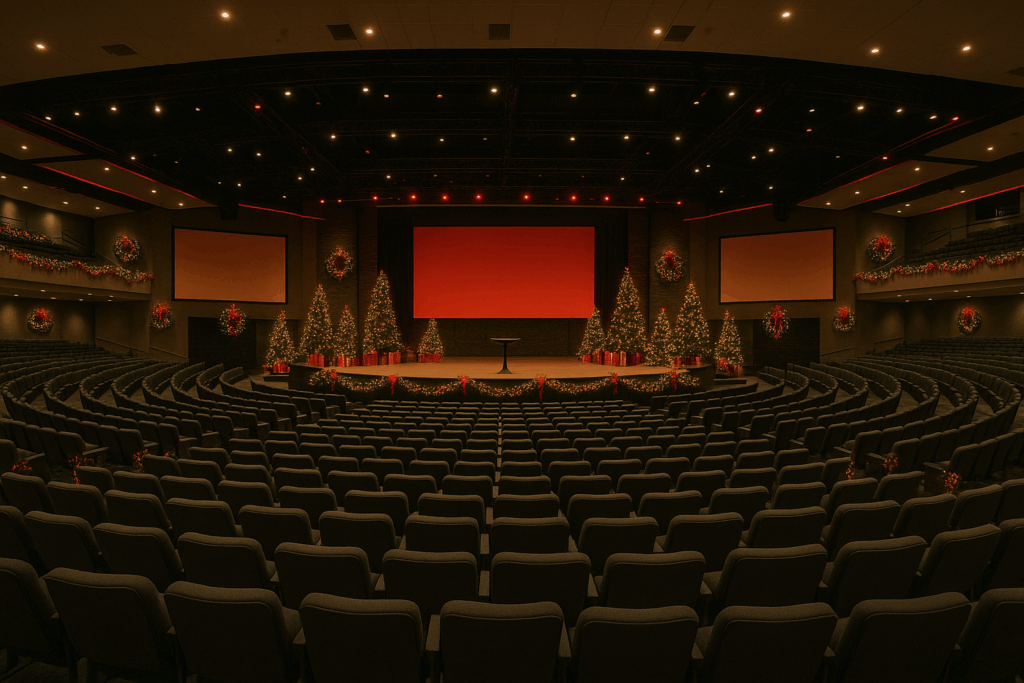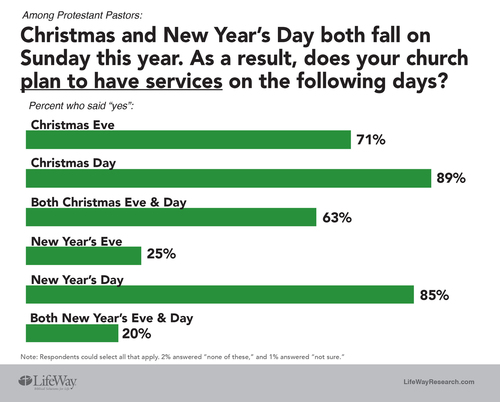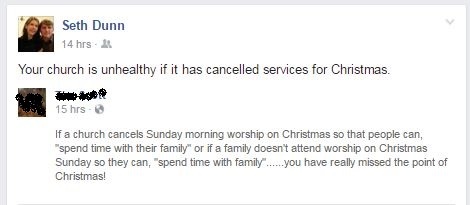This year, the Christmas celebration falls on a Sunday. Accounting for leap years, this happens on regular intervals. It happened in 2011, and will, lest the Lord tarries, happen again in 2022, 2033, 2039, 2044, and 2050.
Since the divine creation of the church following Christ’s resurrection, it has gathered to worship on the Lord’s Day, the first day of the week, the day He rose from the grave. In the early church – and even to some extent today – this shift of days was seen as a blasphemous, contentious move by the upstart Way. Jews gathered on the Sabbath, the seventh day of the week.
But Paul gives a word of apostolic encouragement to the Colossians on this. “Therefore, let no one pass judgment on you in questions of food and drink, or with regard to a festival or a new moon or a Sabbath.” (Colossians 2:16)
It might seem to Christians that the rather rare occasion of the joyous celebration of our Savior’s birth falling on a day in which we regularly gather for collective worship might be a generous, providential gift of grace. We have the worshipful pleasure of gathering on the day when His birth is the preeminent focus which happens, this year, to also be on the same day of the week on which His resurrection is regularly remembered.
Though Scripture does not prescribe for the church any “holy days,” one would think that such a glorious chronological alignment of these two events – the Incarnation and the Resurrection of our Lord – could arguably be revered as particularly noteworthy for the church. For the blood-bought redeemed, these two events are central to the Gospel through which we have been saved. In a temporal sense, they are the Alpha and Omega peaks of Christ’s atoning ministry.
But one notable mega-church has decided to cancel collective Sunday worship this year precisely because Christmas falls on a Sunday. (Actually, given the facts about this church and its heterodoxic “pastor” , it’s arguable that what they do on any Sunday remotely resembles “Biblical” worship.)
According to Bill Willitts, the executive director of “ministry environments” (Whatever that is) for Andy Stanley’s North Point church,
“The Sunday between Christmas and New Year’s just gives us a great opportunity to say thank you, prioritize your family, enjoy a week off.”
“Enjoy a week off?” From what? From church? From worship? Hmm.
“Christianity doesn’t hinge on the truth or even the stories around the Birth of Jesus.” Andy Stanley
Stanley has, in a sermon earlier this month, exhibited his considered disregard for the importance of the Incarnation. Perhaps then it’s no surprise that the opportunity to worship the Savior on the calendar-aligned Lord’s day when His birth is also celebrated is found to be of little regard to him.
According to an article in the Christian Post, “In the past, North Point Community Church has been known to also cancel Sunday services on years when Christmas fell on a Saturday.” So Andy’s disregard isn’t new. He has a track history of accommodating people by diminishing the worship due to our sovereign Lord and King. The Savior can wait, we’ve got family in town and I just need a break.
(North Point, though, isn’t the only mega-church canceling Christmas on Sunday. Perry Noble‘s former church, New Spring, is holding its multi-campus services on Saturday. Steven Furtick‘s Elevation Church is also skipping Sunday. Andy’s father Charles, at First Baptist Atlanta, has also canceled Christmas Sunday services.)
But, according to a survey released by LifeWay Research, most churches will be holding both Christmas Eve and Christmas Sunday services. The details of the survey, entitled Most Churches Open For Business On Christmas, New Years Day, Say Pastors can be found HERE. (We hope it’s actually not “business” they are “open for” but worship, btw.)
John MacArthur, however, points out a fact that Christians must not forget when it comes to God’s Truth.
“ … the Christmas season reminds us of the great truths of the Incarnation. Remembering important truths about Christ and the gospel is a prevalent New Testament theme (1 Corinthians 11:25; 2 Peter 1:12-15; 2 Thessalonians 2:5). Truth needs repetition because we so easily forget it. So we should celebrate Christmas to remember the birth of Christ and to marvel over the mystery of the Incarnation.” (Source)
Truth needs to be repeated. The Gospel needs to be repeated, and often, to others and to ourselves. To diminish the Incarnation is to fail to realize that the babe in the manger was – and is – the Lord of Lords and the King of Kings. To miss that, on any day, is to sacrifice a significant component of reverent worship. To skip it on the day when believers normally gather seems particularly callous to our Lord.
The culture has done what culture should be expected to do with the evident truth of God (Romans 1: 18-23) – it disregards it, suppresses it. Christmas has become not a moment when the world pauses to recognize the birth of the King, but an occasion to engage in “time off” for selfishness, commercialism, and revelry against God. Still, the culture’s festive recognition of this holiday does have its roots in the miraculous event two millennia ago, whether it acknowledges it or not. For a church to need to take “time off” seems less an act of Christian charity, than an accommodation of a pagan culture that does the same thing. But, you’ll recall, we’re not “of that world.” (John 17:16)
As MacArthur says, “people tend to be more open to the gospel during the Christmas holidays. We should take advantage of that openness to witness to them of the saving grace of God through Jesus Christ. Christmas is chiefly about the promised Messiah who came to save His people from their sins (Matthew 1:21). The holiday provides us with a wonderful opportunity to share this truth.”
When considering Paul’s encouragement regarding the Sabbath, Andy Stanley might have an “out.” “Let no one pass judgment.” But on the point from Hebrews 10:25, “not forsaking our own assembling together, as is the habit of some, but encouraging one another; and all the more as you see the day drawing near,” it seems that, for Stanley, the “drawing near” of that day is, like the incarnation, something “I’m not all that concerned about.”
But when the fullness of time had come, God sent forth his Son, born of woman, born under the law,to redeem those who were under the law, so that we might receive adoption as sons. Galatians 4:4
The Incarnation is, of course, essential. To consider it inconsequential, and to intentionally avoid it, just so that we can have “time off” is contrary to “the faith once for all delivered to the saints.” (Jude 3) The redeemed find themselves eternally thankful that Christ didn’t take time off “when the fullness of time had come.”
Indeed, we worship Him because He is always obedient to the Father, and He is always faithful to us.
So when providence has brought to our calendar the focus of two eternity-shaking, epoch-dividing events like the Incarnation and the Resurrection, it hardly seems a time to “take off.”
It seems … rather … a time to worship.
The King has come …
[Contributed by Bud Ahlheim]















